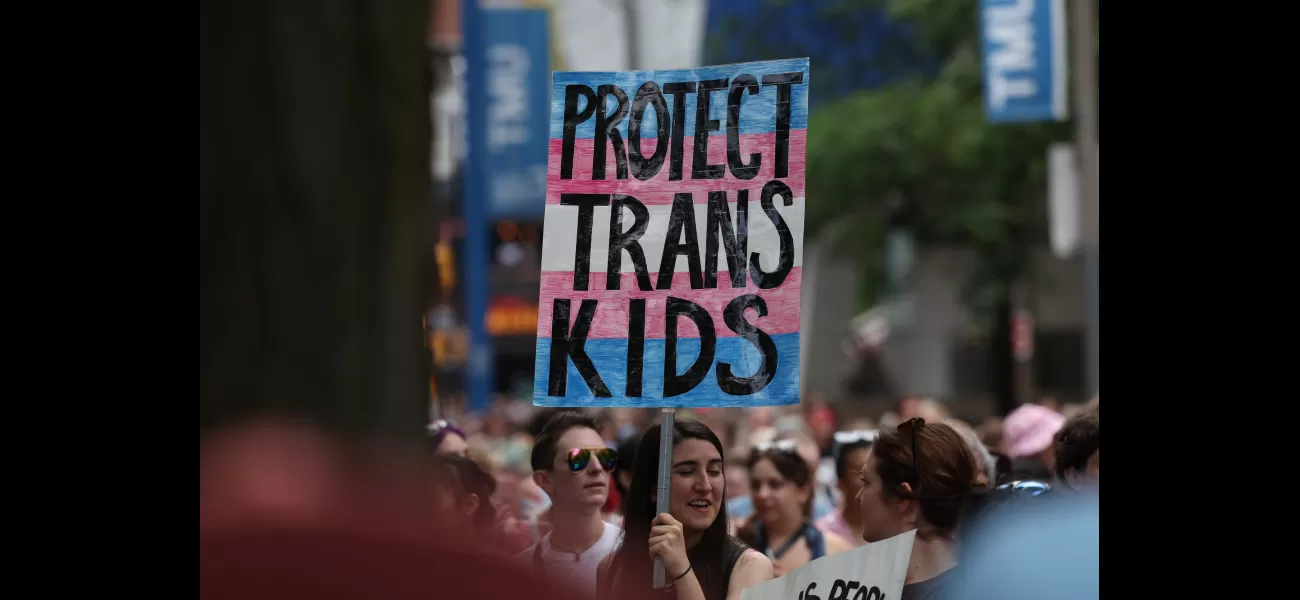Parents want their trans children to thrive despite growing transphobia.
She's a content, secure child who identifies as trans.
August 5th 2023.

For two parents of trans youth, their children's future must be one of 'resilience'. Every month, Hannah, a charity worker in her 40s living in the Midlands, knows that she'll find her daughter, Alex, in tears. Alex is a primary school-aged child who loves playing Minecraft and reading books. She doesn't, however, take much interest in newspapers.
As Hannah says, “She’s a happy, supported kid who happens to be trans. But she is also starting to be more aware of the amount of hate and discrimination out there. She walks to the newsagents to buy a packet of crisps and will see what’s on the front pages of the newspapers.” Alex is suddenly reminded that the wider world is a thing, which brings her anxiety about her future.
Trans youth have been thrown into the middle of the ongoing ‘culture war’ around trans youth. The UK has been steadily declining in an international LGBTQ+ group’s annual ranking of queer rights in Europe, and Victor Madrigal-Borloz, a UN independent expert, said in May that conversations around LGBTQ+ rights, especially trans people, in the UK have become ‘toxic’.
The British government have been drafting guidance for schools on how to best support trans pupils since March, but with no clear timeline for when it’ll be released. Education Secretary Gillian Keegan said that it is vital that the guidance gives clarity for schools and colleges, and reassurance for parents. She also added that schools should be ‘cautious’ and ‘protect single-sex spaces and maintain safety and fairness in single-sex sport’.
Parents of trans children are worried about how the guidelines could impact a trans youngster’s freedom to socially transition. Hannah said, “To deny that and forcibly put a child in a state of prolonged rejection is an incredibly harmful and abusive thing to do. Social transitioning is one of the next strands of the culture war because it’s an easy way to control kids. You have to be misgendered and rejected.”
Trans youth like Alex have no choice but to change schools, drop out or be home-schooled to escape being the target of a ‘culture war’ right now. But research shows that a person who knows someone who is trans is twice as likely to be an ally. Hannah said, “Society as a whole won’t see it as a big deal and won’t be having culture wars over it in 25 years’ time – it will just be part of life.”
Hannah’s focus is to help Alex remain supported, accepted, affirmed and happy at school. She hopes that if Alex can stay resilient, the future won’t be as bleak as it looks now.
Every month, Hannah knows that she will find her daughter, Alex, in tears. Alex is a primary school aged child who loves playing Minecraft and reading books, but not so much newspapers. When she walks to the newsagents to buy a packet of crisps, she is reminded of the wider world and the hate and discrimination that exists out there.
Alex is a happy, supported kid, but she is becoming increasingly aware of the prejudice that exists. She knows that the future may not be kind to her as a trans woman and this can be overwhelming.
Trans youth in the UK have been thrown into the middle of an ongoing ‘culture war’. The UK has been rapidly falling down an international LGBTQ+ group’s annual ranking of queer rights in Europe, and conversations around LGBTQ+ rights have become ‘toxic’ according to a UN independent expert.
The British government has been drafting guidance behind closed doors for schools on how to best support trans pupils. It is not legally binding and Education Secretary Gillian Keegan has stressed that the guidelines will put school children’s ‘safety’ first. However, parents of trans children are not convinced.
Press leaks from murky sources have come to fill in the gaps about what the guidance may include, and Hannah fears that the guidelines will encourage educators and school administrators to limit how much a trans person can be themselves at school.
This has plunged trans youth and their families into a ‘continual state of panic’ as they worry what rules may be implemented. It is an outrageous idea that the government can bring in new rules that can threaten a child’s safety and deny them the freedom to socially transition.
Research shows that a person who knows someone who is trans is twice as likely to be an ally, and Hannah hopes that society will simply accept it as part of life in 25 years time. For now, she is focusing on Alex being supported, accepted, affirmed and happy at school. She wants her daughter to have resilience and to be able to face the challenges that she will inevitably face in the future.
As Hannah says, “She’s a happy, supported kid who happens to be trans. But she is also starting to be more aware of the amount of hate and discrimination out there. She walks to the newsagents to buy a packet of crisps and will see what’s on the front pages of the newspapers.” Alex is suddenly reminded that the wider world is a thing, which brings her anxiety about her future.
Trans youth have been thrown into the middle of the ongoing ‘culture war’ around trans youth. The UK has been steadily declining in an international LGBTQ+ group’s annual ranking of queer rights in Europe, and Victor Madrigal-Borloz, a UN independent expert, said in May that conversations around LGBTQ+ rights, especially trans people, in the UK have become ‘toxic’.
The British government have been drafting guidance for schools on how to best support trans pupils since March, but with no clear timeline for when it’ll be released. Education Secretary Gillian Keegan said that it is vital that the guidance gives clarity for schools and colleges, and reassurance for parents. She also added that schools should be ‘cautious’ and ‘protect single-sex spaces and maintain safety and fairness in single-sex sport’.
Parents of trans children are worried about how the guidelines could impact a trans youngster’s freedom to socially transition. Hannah said, “To deny that and forcibly put a child in a state of prolonged rejection is an incredibly harmful and abusive thing to do. Social transitioning is one of the next strands of the culture war because it’s an easy way to control kids. You have to be misgendered and rejected.”
Trans youth like Alex have no choice but to change schools, drop out or be home-schooled to escape being the target of a ‘culture war’ right now. But research shows that a person who knows someone who is trans is twice as likely to be an ally. Hannah said, “Society as a whole won’t see it as a big deal and won’t be having culture wars over it in 25 years’ time – it will just be part of life.”
Hannah’s focus is to help Alex remain supported, accepted, affirmed and happy at school. She hopes that if Alex can stay resilient, the future won’t be as bleak as it looks now.
Every month, Hannah knows that she will find her daughter, Alex, in tears. Alex is a primary school aged child who loves playing Minecraft and reading books, but not so much newspapers. When she walks to the newsagents to buy a packet of crisps, she is reminded of the wider world and the hate and discrimination that exists out there.
Alex is a happy, supported kid, but she is becoming increasingly aware of the prejudice that exists. She knows that the future may not be kind to her as a trans woman and this can be overwhelming.
Trans youth in the UK have been thrown into the middle of an ongoing ‘culture war’. The UK has been rapidly falling down an international LGBTQ+ group’s annual ranking of queer rights in Europe, and conversations around LGBTQ+ rights have become ‘toxic’ according to a UN independent expert.
The British government has been drafting guidance behind closed doors for schools on how to best support trans pupils. It is not legally binding and Education Secretary Gillian Keegan has stressed that the guidelines will put school children’s ‘safety’ first. However, parents of trans children are not convinced.
Press leaks from murky sources have come to fill in the gaps about what the guidance may include, and Hannah fears that the guidelines will encourage educators and school administrators to limit how much a trans person can be themselves at school.
This has plunged trans youth and their families into a ‘continual state of panic’ as they worry what rules may be implemented. It is an outrageous idea that the government can bring in new rules that can threaten a child’s safety and deny them the freedom to socially transition.
Research shows that a person who knows someone who is trans is twice as likely to be an ally, and Hannah hopes that society will simply accept it as part of life in 25 years time. For now, she is focusing on Alex being supported, accepted, affirmed and happy at school. She wants her daughter to have resilience and to be able to face the challenges that she will inevitably face in the future.
[This article has been trending online recently and has been generated with AI. Your feed is customized.]
[Generative AI is experimental.]
0
0
Submit Comment





